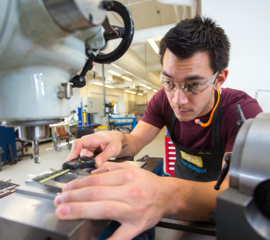Faculty Fellowship Program

CanAssist Faculty Fellowship Program
The University of Victoria announced CanAssist's new Faculty Fellowship Program in 2017, which was created to provide a broad mix of scholars with the opportunity to contribute to the development and evaluation of assistive technology for improved health outcomes and quality of life.
2018/19 faculty fellowships support CanStayHome, a major CanAssist initiative funded by the B.C. government. The outcomes related to this initiative include the development of broad-impact technologies and a web information service that enable vulnerable seniors – including those with dementia – to remain in their own homes for as long as safely possible, while at the same time reducing stress among family and other caregivers and contributing to cost savings for the health system as a whole.
Applications for the 2018/19 fellowships were adjudicated by a selection committee based on the academic merit of the proposal, the views of the committee and the recent relevant scholarly activity of the candidate. Successful applicants received course buy-outs to provide them with time to undertake the research project and funding for graduate student support on their projects. Their appointment includes providing a public lecture on their research activities.
CanAssist is pleased to announce its first fellows:
 Dr. Gawryluk is a clinical neuro-psychology faculty member of UVic’s Psychology Department and an Affiliate of the Institute on Aging and Lifelong Health. Dr. Gawryluk's lab is currently studying neuroimaging biomarkers in Alzheimer’s disease and Parkinson’s disease, changes in the brain that result from mild traumatic brain injury, and variables that impact the progression of multiple sclerosis.
Dr. Gawryluk is a clinical neuro-psychology faculty member of UVic’s Psychology Department and an Affiliate of the Institute on Aging and Lifelong Health. Dr. Gawryluk's lab is currently studying neuroimaging biomarkers in Alzheimer’s disease and Parkinson’s disease, changes in the brain that result from mild traumatic brain injury, and variables that impact the progression of multiple sclerosis.
Her 6-month fellowship research project is focused on a patient-oriented approach to improving care for seniors in our community. Her research includes exploring with focus groups what they consider to be the most imperative approaches that have allowed them to function well at home, the most important challenges they face, and the characteristics that they view as necessary for successful implementation of technological intervention/prevention devices.
Following the focus groups, the key domains for benefit from an intervention from the patients’ perspective will be identified and used to develop a population-wide survey. Results from the survey will guide initiative priorities, assistive technology development and interventions at different levels of progression along the continuum of cognitive impairment.
 Dr. Borycki is the Director of Social Dimensions of Health and Health and Society programs at UVic, a professor in the School of Health Information Science and an Affiliate of the Institute on Aging and Lifelong Health. Prior to coming to UVic, Dr. Borycki spent more than 15 years working in healthcare in varying roles in chronic disease management, geriatrics, case management and health information technology design and implementation management.
Dr. Borycki is the Director of Social Dimensions of Health and Health and Society programs at UVic, a professor in the School of Health Information Science and an Affiliate of the Institute on Aging and Lifelong Health. Prior to coming to UVic, Dr. Borycki spent more than 15 years working in healthcare in varying roles in chronic disease management, geriatrics, case management and health information technology design and implementation management.
Her 12-month fellowship will focus on consumer and caregiver use of technologies to promote independence and wellness in response to disability and chronic illness. Her research project addresses the need for a health informatics-consumer technology evaluation that reports on the quality of technologies available and the ability of consumers and caregivers to integrate health technology into their lifestyles in a way that achieves positive outcomes.
Faculty who have questions about CanAssist's fellowship program should contact Executive Director Robin Syme at rsyme@uvic.ca.
Go to Top
